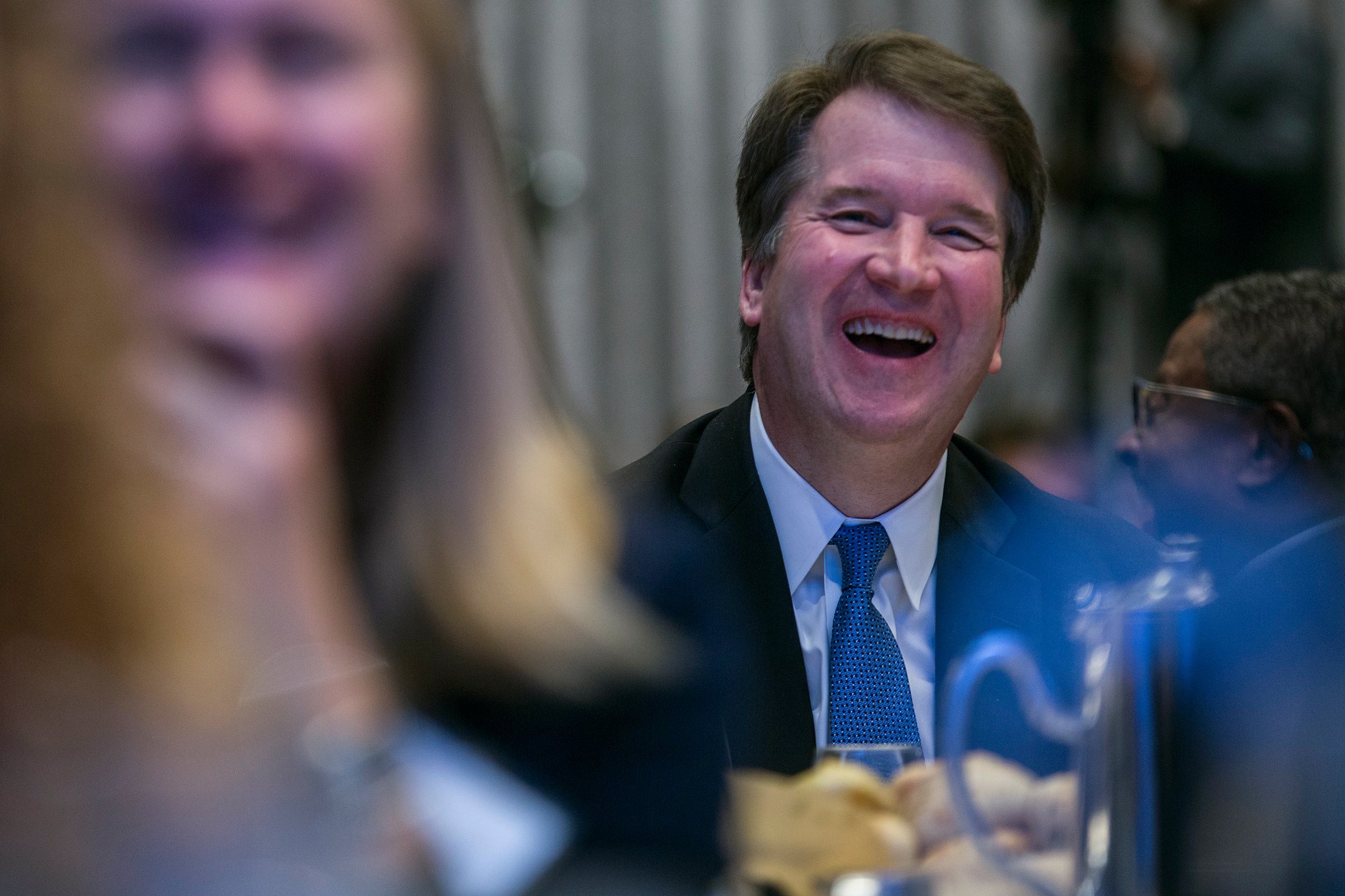
When Brett Kavanaugh spoke at an annual Federalist Society dinner Thursday night, controversies abounded in the world outside. That day, President Trump’s lawyers had asked the Supreme Court to block an investigation in New York from receiving his tax returns. Earlier that same week, the Supreme Court heard oral arguments in a heated case over whether Trump can end the Deferred Action for Childhood Arrivals program (DACA) program. The Chief Justice may soon be called to oversee an impeachment trial in the Senate.
But Kavanaugh did not wade into any of these topics, or even talk much about his judicial philosophy more broadly. “I do not plan a deep speech about the law,” he said to the assembled crowd of roughly 3,000. “Let’s be real. You don’t want to hear one, and I don’t want to give one.”
Instead, in his first major public speech since he was confirmed just over a year ago, Kavanaugh spoke personally and at times emotionally about his confirmation and the ensuing fallout when Christine Blasey Ford accused him of sexual assault last fall. (He denies her allegations.) It was a revealing look into the mindset of the newest justice who occupies Anthony Kennedy’s former swing seat on the court, and who now holds immense power over issues ranging from abortion rights to executive authority.
Read more: Inside Brett Kavanaugh’s First Term on the Supreme Court
“There’s a saying that adversity introduces a man to himself,” Kavanaugh said. “It also reveals your true friends. I’m a lucky man to have a lot of friends. Through the good days and the bad, I never felt alone.”
Kavanaugh has maintained a low-profile since his confirmation both personally and judicially, hewing closely to Chief Justice John Roberts during his first term. Just outside the doors of Union Station in D.C., where the dinner hosted by the conservative legal organization was held, progressive advocacy group Demand Justice had commissioned a mobile billboard to play Ford’s testimony on a loop.
“My friends paid a heavy price,” Kavanaugh said, of those who publicly supported him during his confirmation in 2018. “Way too heavy a price. I’m well aware of that and it pains me daily. I signed up for what I knew would be an ugly process— maybe not that ugly. But my friends did not.”
He said his theme of the night was “gratitude,” and thanked certain specific people who stood by him. He said former White House Counsel Don McGahn sent him clips from the 2004 movie Miracle about the 1980 U.S. men’s Olympic hockey team—a film they both love—to help him during the confirmation. He spoke about his wife and two daughters, choking back tears as he spoke about one of the girls. “Matt Damon would have made it through this,” he quipped, referencing the actor’s portrayal of him on Saturday Night Live.
But he also pulled back the curtain a bit on what his life has been like since then as the newest Supreme Court justice, divulging stories and anecdotes that spoke to the humanity of the justices behind the staid ceremony of the court. He talked about the regular lunches they have together, and said they passionately debated the controversial call from the 2019 World Series over whether Washington Nationals player Trea Turner was inside the baseline in Game 6. Kavanaugh is an avid Nationals fan, and a sports nut generally, and he said Justice Elena Kagan told him that his replacement of Kennedy “has caused a significant increase in sports talk, and a major, major decrease in Shakespeare analysis” at these lunches.
“What can I say?” Kavanaugh joked. “To thine own self be true.”
Kavanaugh added that he has taken over cafeteria duty, a menial task reserved for the newest justice on the bench. When he arrived he said he thought it was an “outrage” when he realized they didn’t serve pizza. So he has brought pizza to the Supreme Court’s cafeteria. “My legacy is secure,” he said.
He talked about the inspiration he derives from Kennedy, for whom he once clerked, the late Justice Antonin Scalia, and feminist icon Justice Ruth Bader Ginsburg, among others. He said he has been “overwhelmed by the generosity” of the eight other current justices, calling them “collegial and gracious and respectful.”
And while he stayed away from wading into any issues, cases, or legal discussions, at the end of his speech he noted, “I am optimistic about the future of America, and our independent judiciary.”
More Must-Reads from TIME
- Cybersecurity Experts Are Sounding the Alarm on DOGE
- Meet the 2025 Women of the Year
- The Harsh Truth About Disability Inclusion
- Why Do More Young Adults Have Cancer?
- Colman Domingo Leads With Radical Love
- How to Get Better at Doing Things Alone
- Michelle Zauner Stares Down the Darkness
Write to Tessa Berenson Rogers at tessa.Rogers@time.com